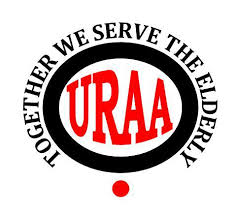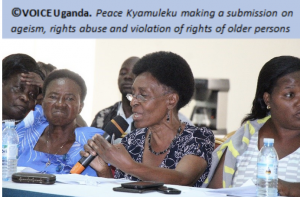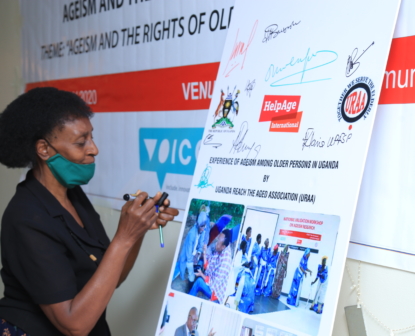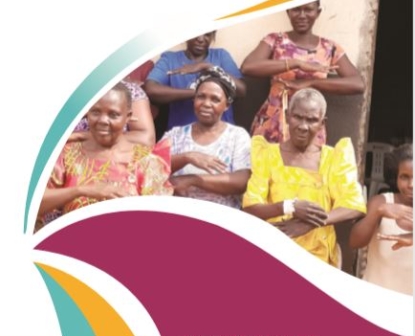Project
Understand and Challenge Ageism Campaign
-
Amount Funded
156,762 EUROProject Duration
01 Aug 2018 - 31 Jul 2020 -
-
Lead organisation
-
Uganda Reach the Aged Association (URAA) promotes family/community care as opposed to institutional care which in many ways tends to alienate older persons. URAA works in partnership with others to support older persons and age care organizations nationally. URAA mains target is to see older persons and children under their care in Uganda living a dignified self-fulfilled poverty free life. URAA puts a high consideration on the gender aspect, especially on women and girls. It also follows the principles of leave no one behind (LNOB) and uses intergenerational approaches in its work. This creates solidarity across generations and sustainable developments. URAA believes in wisdom, experiences, energy, and ideals of older person’s women and men, youth, and OVCs under the care of older persons. It supports intergenerational dialogues on Human right issues and gender equality and ensures that all people young and old recognise themselves as the owners, drivers, and beneficiaries. This is done in community dialogues between rights holders and duty bearers.
-
Organisation
Uganda Reach the Aged Association (URAA) promotes family/community care as opposed to institutional care which in many ways tends to alienate older persons. URAA works in partnership with others to support older persons and age care organizations nationally. URAA mains target is to see older persons and children under their care in Uganda living a dignified self-fulfilled poverty free life. URAA puts a high consideration on the gender aspect, especially on women and girls. It also follows the principles of leave no one behind (LNOB) and uses intergenerational approaches in its work. This creates solidarity across generations and sustainable developments. URAA believes in wisdom, experiences, energy, and ideals of older person’s women and men, youth, and OVCs under the care of older persons. It supports intergenerational dialogues on Human right issues and gender equality and ensures that all people young and old recognise themselves as the owners, drivers, and beneficiaries. This is done in community dialogues between rights holders and duty bearers.
-
Project
Understand and Challenge Ageism Campaign project promotes a campaign on understanding and challenging ageism of older persons in Uganda, transforming humanitarian and development public and private sector policies. This improves access to social services such as health, empowers the older persons to lobby for timely and adequate service delivery by engaging in planning and budgeting processes, policies and programmes. Older persons (OPs) in Uganda face significant issues ranging from poverty, lack of access to adequate health and financial services, income insecurity, exclusion from health insurance schemes (as they are considered a high risk group). The project challenges the understanding, perceptions, and attitudes at individual, family and community level towards older persons. This is done through rolling out an Ageism campaign strategy at national level (starting with 6 pilot districts) in Uganda, generating evidence to strengthen national, district and community structures and share best practice documents for meaningful engagement with the respective stakeholders, government and private sector departments. This data is then shared in local, national and international fora for testing and scaling up.
-
-
Understand and Challenge Ageism Campaign project promotes a campaign on understanding and challenging ageism of older persons in Uganda, transforming humanitarian and development public and private sector policies. This improves access to social services such as health, empowers the older persons to lobby for timely and adequate service delivery by engaging in planning and budgeting processes, policies and programmes. Older persons (OPs) in Uganda face significant issues ranging from poverty, lack of access to adequate health and financial services, income insecurity, exclusion from health insurance schemes (as they are considered a high risk group). The project challenges the understanding, perceptions, and attitudes at individual, family and community level towards older persons. This is done through rolling out an Ageism campaign strategy at national level (starting with 6 pilot districts) in Uganda, generating evidence to strengthen national, district and community structures and share best practice documents for meaningful engagement with the respective stakeholders, government and private sector departments. This data is then shared in local, national and international fora for testing and scaling up.
-
Voices do not age
Many people wish to live long lives, but few consider what it means to live long and age. Ageing in dignity rarely comes up in conversations yet this remains to be the biggest concern for older people. Old age comes with its own challenges; poor health, access to and control of one’s property, lack of family support, exclusion from society, and an undignified life among many others. There are few organisations that have programmes designed to champion the cause of old people. To make it worse, many of the older people are away from sight in the rural areas.
Uganda Reach the Aged Association (URAA) set up Understand and Challenge Ageism Campaign project to promote understanding and pose a challenge to ageism directed at older persons in Uganda. The project aimed to ensure priorities and rights of older persons are promoted in Uganda national and sectoral plans and that interventions contribute to the achievements of the SGDs principle of No One Left Behind. The approach adopted included supporting the economic empowerment of vulnerable older persons to support themselves and those under their care, addressing social justice of older persons and those under their care, carrying out research, policy lobbying and advocacy for older persons, strengthening networking and integration between URAA and other stakeholders, and strengthening URAA institutional capacity and effectiveness.
As a result, the project transformed the development of public and private policies and improved access to social services, health and focused education on the friendliness to the older persons campaign against ageism. The project empowered older men and women to be at the forefront of advocacy and lobbying for timely and adequate service delivery. This was achieved by monitoring services and engaging in the planning and budgeting process and development of policies and programmes. It also improved understanding of the perceptions and attitudes towards older persons at individual, family and community level. The national Ageism Campaign strategy was documented and the learnings shared at regional and international forums.

There was increased visibility of older persons’ issues in the project district’s plans and budgets. A quarterly budget of Shs. 350,000 and Shs.750,000 was allocated to Kitgum and Adjumani respectively to be spent on older persons’ activities. This enhanced their participation and engagement in programmes at local and national level on capacity building, empowerment and access to information.
Kabale, Centenary bank provided a specific counter for older persons, while Kitgum hospital allocated a consultation room for older persons as part of affirmative action in response to interventions by some service providers in favor of older persons. Such changes increased access to public services by older persons at district level.
There was also enhanced participation of community members (public debate) on issues of ageism and rights of older persons (Exposing Ageism) and increased interest of the media on the exposing ageism and the rights of older persons. This strengthened confidence and capacity of Ageism Challenge Ambassadors in articulation and challenging ageism, rights abuse and violation of rights of older persons at different levels.
-
News






